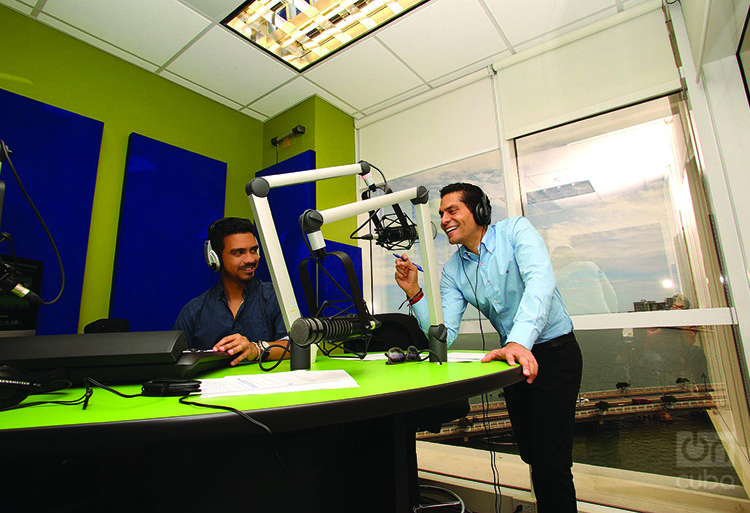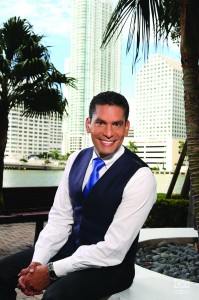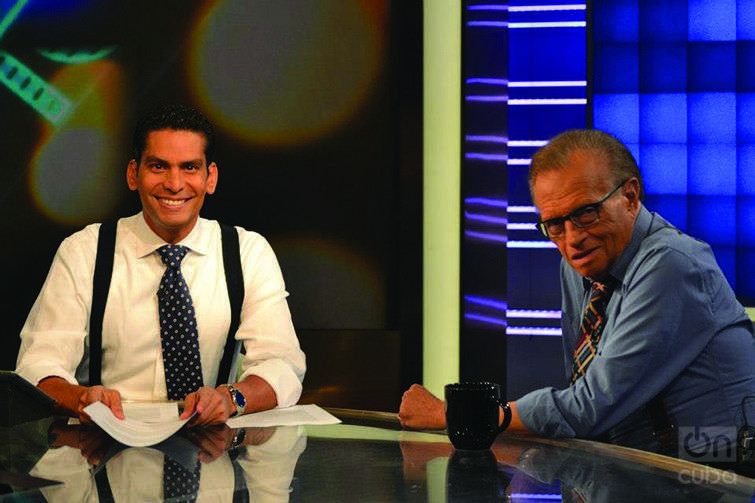It’s hard to get hold of him. Between his work as a journalist for CNN, his talks and promotion for his books, and the countless dreams that engulf him, we’ve had to postpose our interview three times. Finally, we get him on the telephone; I’m in an office, and he’s at the airport, where he spends “almost a quarter of my time,” he tells me.
Ismael Cala is a Cuban “from Santiago”—as he always emphasizes—who studied art history and who one fine day discovered that communication was his true vocation. He did some stringing for his provincial radio and television stations and eventually became the host of the local newscast. He was still so young that “the make-up artists had to paint a moustache on me.”
In the Cuban capital, his career took off. On the radio he hosted the show “From 5 to 7” during the salsa music boom, and he made it into the most popular show of the hour. He also was a central figure in the return to TV contests, on programs such as “Who Knows?” and emceed dances at nightclubs like the Aché and the Hotel Capri’s Salón Rojo.
He moved to Toronto and studied journalism. And his real graduation, he says, “was the pope’s visit in 2001; CNN gave me 11 days to prepare everything, and that’s really when my career started in the world of news.”
However, it didn’t last long. “I’m very restless and I’ve always wanted to do a lot of things.” In Miami, without dissociating from CNN (for which he covered Saddam Hussein’s execution), he worked mornings at the Univisión network and achieved unquestionable success hosting the popular América Tevé program Calando fuerte.
Cala speaks slowly, little by little. As he relaxes, you can hear a hint of the eastern Cuban lilt in his speech. “This has been my life, until I realized that what defines me is not being a journalist, historian or host; my work has led be to become a humanistic communicator, and my concerns consist of transmitting values.”
Throughout his career, he has interviewed many luminaries of all types: José Mujica, former President of Uruguay; Larry King, the legendary CNN host; Rigoberta Menchú, Nobel peace laureate; and Enrique Capriles, Venezuelan opposition leader. They’ve all been on the other side of his table, and he has learned something from each and every one. “Conversation is always a learning process, a way of complementing the view I have of things.”
Cala does not dwell on this; this isn’t actually what he wants to talk about. I get the impression that he’s waiting for questions that I haven’t asked him yet, and that’s why he jumps in. “Right now I’m starting some new projects. I want to do a short series of 40 episodes for radio, sort of mini-radio documentaries, a theater of the people, on a weekly basis. The stories are in them, and you should put yourself at people’s disposition, because that way you’re helpful and you help yourself.”
“My books have opened a path for me that I will never give up. Writing is the way that I’ve found to reach more people, to provide a response to what society needs. I’ve set out to provide tools that help people to know themselves and live. I’ve been very lucky; a little bit of my experiences can help young people, who often feel empty when faced with the question ‘What should I do?’
“That’s why we’ve created Cala Enterprises. It’s not a company for me to become a millionaire; it’s a project that creates spaces and provides consulting services. We started out with two people and now we’re six, with a very efficient communication team. I really enjoy giving talks; it’s the way I’ve found to give back all of the good fortune that’s been given to me.”
I interrupt him, because I’m afraid if I don’t, “this” will become a monologue instead of an interview. I bring up the subject of his books; he’s had two published so far: The Power of Listening and A Real Son of a B….
“The Power of Listening is autobiographical. It’s not fiction. I’ve always been maladjusted, but by listening I’ve learned how to grow in friends. Listening has made me into what I am, listening and observing…. My interviews are always conversations in which the protagonist speaks; I always say that I’ve never learned anything while talking.
However, A Real Son of a B… is a fictional story that tries to turn the negative to our favor. In it, I talk about three important aspects: passion, patience and perseverance. With these three elements we can advance, and so seek our true calling.
“They are brief dialogues between a “life coach” and a 24-year-old man, a recent film graduate who lives in Los Angeles. I wanted that to be the setting because it’s a city of immigrants and the two characters are Latinos. This “life coach” has a lot to do with me, the young emotional illiterate that I was when I was 24, but, I repeat, it is not autobiographical.
“I dedicated this book to my mom. For Latinos, it’s very hard to use a title like that: our mother is sacred. It comes from an insult I received on Twitter, when somebody told me I was “a real son of a b….” So then I thought that I had the three “P’s” of success—passion, patience and perseverance—and that my entire journey has been turning the negative into positive, and even though I had to do a lot of explaining to my mother, the book came out like that: A Real Son of a B….
“As human beings, we can become a better version of ourselves. I used my family history, full of violent episodes, to grow. Our quality of life is always the quality of our emotions. That is what I was going for, first with The Power of Listening and now with this audacious thing, A Real Son of a B….”
As I listen to him, I don’t know where the journalist ends and the preacher, the self-help book writer, begins, so I ask him about it:
“I’m not at all worried about being called a writer of self-help books. Or of being called a preacher. I try to narrate my experience, to help people find their calling, but without looking for anything else. If they call me that and the message is effective, then I’m satisfied. I perceive it in the talks that I give all over Latin America. I don’t offer a method; it’s a system that each person can adapt to his or her way of being.
More than half an hour has gone by and he hasn’t mentioned Cuba, maybe because I haven’t asked, and I think this interview is increasingly done by him. When I decide to pop the question, he doesn’t let me get past the word “Cuba”:
“Whenever I talk to my friends, they tell me that when I try to say who I am, what they hear is somebody who is talking about what it is to be Cuban, about Cuban culture, and how my roots are still on the island, in Santiago…. I’ve never stopped thinking in Cuban and feeling like part of my people. We Cubans need each other. Those differences between Miami and Havana have to be overcome already, and politics and ideology need to be separate from culture. We Cubans can’t be defined by a single form of politics or ideology; being Cuban is much more than that—it’s sharing a hope, a culture. I’m not an activist, but I do assert that we have to overcome those paradigms and recognize ourselves in our culture.”
This interview has slipped out of my hands. So far, after an hour of conversation, I haven’t asked a single complete question…. I hurry: are you coming back to Cuba?
“Of course. I want to do it this year, in 2015. I want to present my radio documentary project there, look for stories. I need to present my books, give my talks. I would love to do my program for CNN, but what I need most is a reunion trip, to be with my friends, with all of those people from whom I learned…. I want to go back to Santiago, to Caney, travel all over my island, help my people. I’m enormously homesick for my land. I want to work in Cuba.”
We bid each other farewell. He leaves me with the impression that he speaks with the three qualities he promotes: passion—giving himself over in what he says; patience—forgiving the fact that I didn’t know how to ask him what he was expecting; and perseverance—qualifying and defining what he says, so that we don’t miss anything.
But one thing he did was to make that interview, if you can call it that, into a way of convincing me that, as he suggests, listening is always much better than talking.












